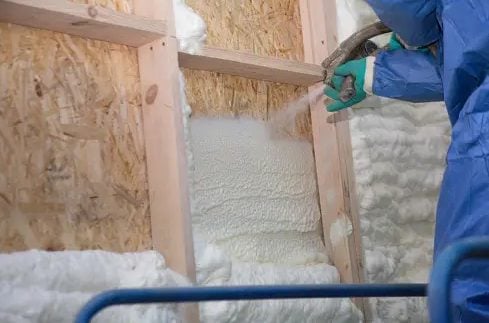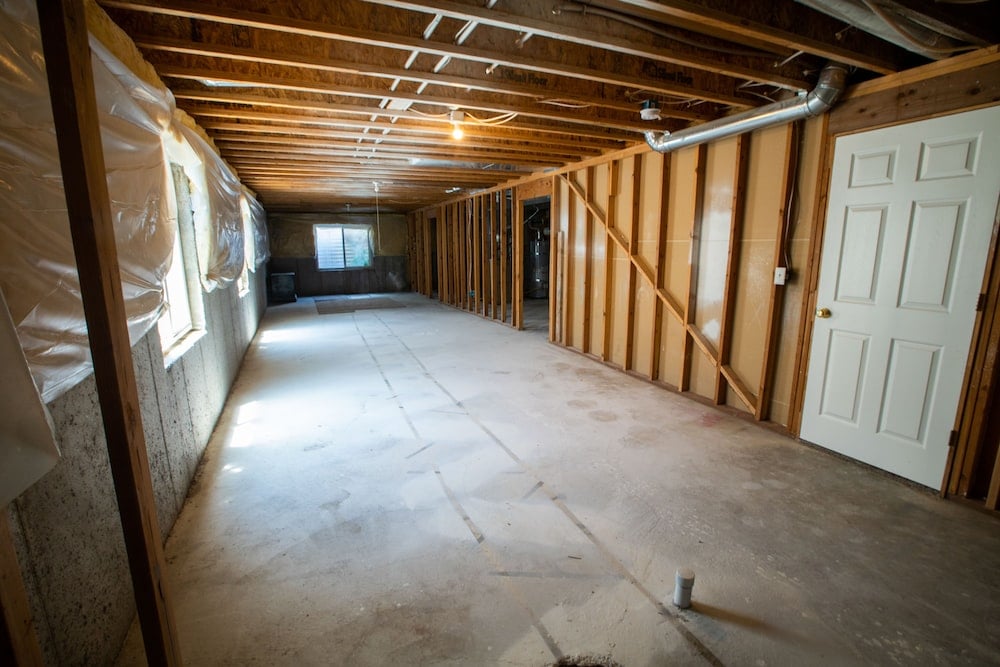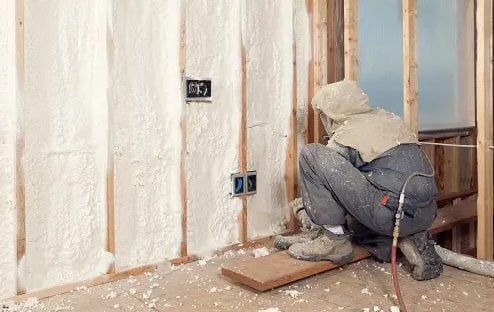BLOGS
Spray Foam Insulation Cost
Because of its energy efficiency, simplicity of installation, and long-term value, spray foam has become a popular insulation material for both new construction and existing homes. Employing a skilled insulation specialist will assist guarantee the best outcome.
How much does Spray Foam Insulation Cost?
Spray foam insulation installation normally costs 202,100 pesos, while the majority of jobs cost between 96,500 pesos and 181,600 pesos. The amount and cost of spray foam, the space you’re insulating, the thickness of the foam, and whether you use open- or closed-cell spray foam will all affect the ultimate cost of your job.
Table of Contents:
- How much does Spray Foam Insulation Cost?
- What is Spray Foam Insulation?
- How does spray insulation work?
- Where should you use spray foam insulation?
- What are the types of spray foam insulation?
- What is the R-value and thermal resistance of spray foam?
- Is Spray Foam Insulation worth it?
- What is the installation process?

What is Spray Foam Insulation?
Spray foam insulation is a type of insulation material commonly used in construction to seal gaps and create a thermal barrier within buildings. It is known for its excellent insulating properties and versatility.
The installation process involves spraying the mixed foam onto the desired surfaces, where it expands and hardens within a relatively short period, creating a continuous and airtight barrier that effectively seals gaps, crevices, and irregularly shaped areas. The foam adheres to the surfaces it is sprayed on, providing an excellent air and moisture barrier, which can contribute to increased energy efficiency in a building.
Some benefits of spray foam insulation include:
- High insulation value (R-value)
- Improved energy efficiency
- Enhanced air sealing properties, reducing drafts
- Moisture resistance (closed-cell foam)
- Increased structural integrity (closed-cell foam)
- Noise reduction (open-cell foam)
- Long-lasting and durable
However, spray foam insulation should be installed by professionals, as it requires specialized equipment and knowledge to ensure proper application and safety due to the chemical reactions involved during installation. Additionally, proper ventilation and safety precautions are essential during installation installing spray foam, to protect against fumes and exposure to the chemicals used in the process.
How does spray insulation work?
The application of a liquid insulation solution that expands and solidifies into a foam-like substance is known as spray foam insulation. It is frequently used to provide proper insulation, increase energy efficiency, and improve comfort in both residential and commercial structures. Let’s look at how spray foam functions with options for open-cell, traditional insulation and closed-cell spray foam:
- Preparation: The space must be prepared before spray foam insulation can be applied. Cleaning the surface and making sure it is dry and free of impurities like dust and debris are usual steps in this process.
- Application: The liquid foam mixture will be applied to the surface using a specialist spray cannon. When the two components combine chemically, the foam swiftly grows and foams up from its liquid beginnings. Due to its ability to expand, foam can fill up voids and other irregularities to form a continuous layer of insulation.
- Expansion and Curing: The foam fills in any uneven areas and forms an airtight seal as it is sprayed onto the surface, expanding to many times its initial volume. After then, the foam starts to cure and stiffen. The type of foam and the surrounding environment will have an impact on the curing process.
- Insulation Properties: The foam creates a firm, long-lasting insulation layer that resists heat transfer once it has dried. The foam’s cellular structure traps air, which enables it to also trap moisture. Due to its higher density than open-cell foam, closed-cell foam is more effective in blocking moisture and offering better insulation value.

Where should you use spray foam insulation?
Insulation made of spray foam can be used in both new and renovated dwellings. Spray foam insulation is particularly helpful for filling irregularly shaped areas and tiny gaps between materials because it can expand to fill small and difficult-to-reach locations. Effective applications of spray foam insulation costs include:
- Attics
- Basements and crawl spaces
- Wall cavities
- Around HVAC systems
- Around windows, doors and other irregularly shaped spaces
- In roofs and under floors
What are the types of spray foam insulation?
A specialist can assist you in choosing from the two main varieties of spray foam depending on how much foam you require, where you intend to apply it, and your budget. Polyurethane foam is frequently used in the creation of both kind of spray foam insulation.
Open Cell
Half-pound foam, commonly known as open cell spray foam, has a more spongy texture and is lighter and less dense. Although it is less expensive, it offers less insulation and has a lower R-value of about 3.5 per inch. Although it offers an air seal, it won’t offer water protection, hence it shouldn’t be utilized below ground.
Closed-cell
Two-pound diy spray foam insulation, also known as closed cell spray foam, is more stiff, denser, and costlier to install. It offers additional protection against heat loss because, at around 6.5 per inch, it has a higher R-value than open-cell spray foam insulation. It can function as an air and vapor barrier since it has a lower porosity.
What is the R-value and thermal resistance of spray foam?
A building can be kept warm in the winter and cool in the summer by using insulation to prevent heat from entering or exiting crawl space. The ability of insulation materials to stop heat from escaping is determined by their R-value, which is a measure of their thermal resistance. The better a material’s thermal resistance, the higher the number.
Spray foam with open cells has an R-value of around 3.5, per square foot per inch whereas foam with closed cells has an R-value of roughly 6.5 per inch. Spray foam also acts as an air barrier, providing insulation for walls as well as sealing any air leaks or holes. Additionally, you can stop water and moisture from seeping by using closed-cell foam.

Is Spray Foam Insulation worth it?
A well-liked substitute for fiberglass batting insulation is spray foam insulation. Spray foam should be taken into account for your new or existing home for the following reasons, even though its initial cost will be more than batt insulation.
- Tight Seal: Other insulating materials cannot fit into small or oddly shaped spaces the way spray foam does. It is thought to be extremely effective at preventing heat loss, tight seal air leaks, and it even serves as a sound barrier.
- Long-term Value: While spray foam may initially cost more than fiberglass insulation, it can assist reduce energy costs and result in financial savings over time.
- Health Protection: Spray foam can also serve as a water barrier, keeping moisture out of the house and away from the source of any mold or mildew.
Poor preparation or installation are frequently to blame for spray foam insulation’s main problems, which can include the foam beginning to peel away from old insulation or adjacent materials, holes being left in the foam layers, or uneven application. These problems highlight how important it is to hire a skilled expert to install your insulation.
What is the installation process?
Spray foam is applied where it is needed. A heated hose is used to apply spray foam or a mixture of two liquid substances onto the surface that they will insulate. The two substances interact chemically, foaming and heating up inside the hose as a result. The substance enlarges and ultimately solidifies.
Even if a DIY spray foam kit makes it possible for you to first install spray foam insulation on your own, hiring a professional insulation contractor is strongly advised. Experienced experts can help you achieve the best results and can help prevent erroneous insulation selection, faulty installation, and any safety hazards that may emerge from lower-quality materials. They also have the information, resources, and ability to assist you avoid these issues.
Visit Brittany’s official property page to know more about the beautiful thematic offerings of Brittany or follow us on our Facebook, Linkedin, Instagram, and Twitter accounts!
Suggested Read: Smart Home And Glass House: What It Brings To The Table
Suggested Read: How Can A Sustainable Glass House Be Energy Efficient
Suggested Read: Luxury Collectibles: Luxurious Scents For Your Home
Suggested Read: Insulation Guide For Energy-Efficient Luxury Homes
Suggested Read: Cooling Amenities Inside Your Luxury Home















